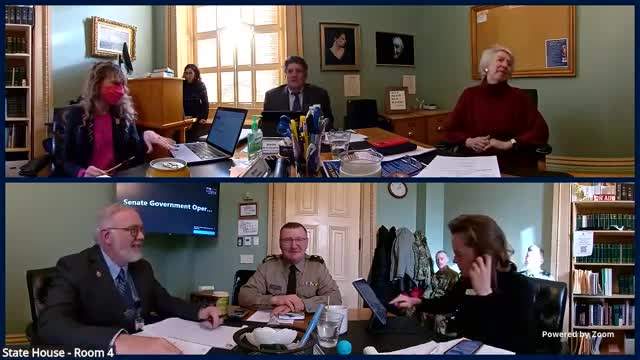Vermont National Guard reports overseas deployments, recruitment shortfalls and expanded harassment‑prevention efforts
Get AI-powered insights, summaries, and transcripts
Subscribe
Summary
At a Jan. 21 Senate Government Operations Committee hearing, Major General Greg Knight described current deployments of Vermont Guard units, outlined recruitment shortfalls and new recruiting partnerships, and detailed changes to sexual‑harassment and sexual‑assault prevention and reporting systems.
Major General Greg Knight, Vermont’s adjutant general, told the Senate Government Operations Committee on Jan. 21 that roughly 275 Air National Guard members are on a templated 90‑day deployment to the Indo‑Pacific region and that the 86th Brigade Combat Team will send about 1,100 soldiers overseas for allied training this spring.
The report matters because the Guard’s overseas commitments, recruiting shortfalls and internal reforms together shape the state’s ability to respond to emergencies and preserve current force structure. Knight warned that persistent vacancies could change what units the state can host and operate.
Knight described the Air Guard’s work with the F‑35 “Lightning II” fleet and said the wing is fielding an agile combat employment concept that uses many dispersed, logistically austere locations to increase interoperability with partners. “They are simply the best fighter wing in the inventory,” Knight said, adding that their operations are driving innovations the active force is watching.
On personnel and readiness, Knight said the Guard faces significant recruiting gaps. He said the force has about 700 open positions across the Army and Air Guard and that the Air Guard is roughly 100 personnel short of its desired end strength. To address that shortfall, the Guard has launched recruitment partnerships with private employers and a program Knight called PRIME (Partner Recruiting Initiative for Military Employers), which currently works with about 20 employers and guarantees interviews for returning service members; Knight said the program will expand to include military spouses, dependents and internship pathways. Knight also said the Guard recently signed an agreement with the University of Vermont’s continuing‑education programs to support marketing and workforce development for recruits and veterans transitioning to civilian jobs.
Knight warned that persistent vacancies could cost Vermont force structure. He said a nationwide modernization aligned with active‑duty Army plans could shrink some Guard billets and, if Vermont’s numbers fall, the state could lose units such as the combat engineer battalion or the cavalry squadron. He urged state legislators to help publicize career and training opportunities.
Knight described a multi‑year push to modernize aging armories and said he envisions four “super‑armories” positioned at major highway corridors to improve training and response efficiency compared with many small, aging facilities.
On sexual‑harassment and sexual‑assault prevention, Knight said the Guard has moved toward prevention and reporting reforms. He credited Nikki Sorrell, the Guard’s sexual‑assault response coordinator, and Todd Hundley, the state equal employment manager, with creating an in‑stride, post‑mobilization briefing and a simplified reporting flowchart intended to reduce barriers to reporting. Knight said Vermont filled its recommended positions for an integrated primary‑prevention workforce — a recommendation coming from a DoD review — and described an inspector general channel intended to be a confidential reporting avenue for service members. Knight said the Guard recorded two incidents of sexual harassment in 2024 (one substantiated, one unsubstantiated) and zero reports of sexual assault for 2024, but stressed that delayed reporting can affect year‑to‑year totals.
Knight and committee members also highlighted the Guard’s international State Partnership Program. Vermont’s partnerships include North Macedonia, Senegal and Austria. Knight described recent medical readiness work in Senegal: a team of roughly 35 U.S. and partner providers worked at three austere clinics and provided care to 791 patients over 12 days. He said those exchanges produce training and relationship building that are difficult to replicate in U.S. training environments.
Knight noted demographic gains in the Guard and urged the committee to publicize those opportunities. He said lawful permanent residents who enlist historically can qualify for expedited naturalization timelines tied to military service; Knight said many recent enlistees have come from immigrant communities and that the Guard helps some members pursue education and citizenship.
Other items Knight highlighted included band and cultural exchanges (the Guard band recently performed overseas) and plans to continue joint reporting to the committee on prevention work. He closed by urging legislative help in recruitment outreach and offering to return with additional material when requested.
Questions from senators focused on noise from F‑35 operations and progress on mitigation, the Guard’s recruiting numbers and programs, and specifics of the harassment‑prevention workforce and reporting flowcharts. Knight said noise‑reduction measures are in planning with National Guard Bureau and environmental analysts and that changes to takeoff procedures are expected to reduce some departure noise once implemented.
